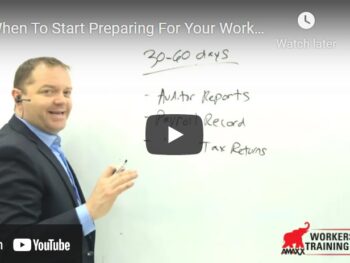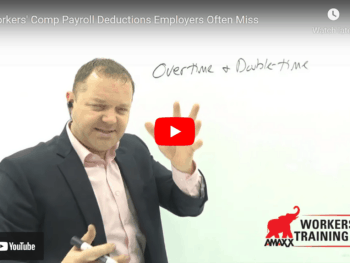Some situations where an employee incurs an injury are not compensable, and some situations are compensable only if the facts surrounding the injury meet the definition of an accident. The following discussion centers on unusual circumstances that may or may not be compensable. These unusual circumstances will be compensable in some states, but not in others. If you have one of these unusual circumstances of injury to occur, consult with your workers’ compensation adjuster or defense attorney to see if the event causing the injury is compensable in your state.
Assaults:
When an assault occurs in the workplace, the normal deciding factor is whether the assault is connected to the employment. If the assault arises out of the employment, the injury is normally covered by workers’ compensation. For example – the convenience store employee who is assaulted in the course of a robbery. If the assault is not related to employment, the injury is normally not covered by workers’ compensation. For example – the truck driver who is hit over the head and robbed.
Click Link to Access Free PDF Download
“Workers’ Comp Claims Review Checklist: 9 Must-Have, Serious-Impact Elements”
The work status, whether a co-worker or a non-employee,of the person assaulting the employee is usually not a factor. The relationship of the assault to the employment is normally the key factor on whether or not an assault is covered by workers’ compensation.
Attacks by co-workers:
When one employee attacks another, the relationship of the injury to the employment normally determines whether or not the injury is covered by workers’ compensation. For example – the frustrated employee who punches the supervisor in the face after receiving a poor performance review. The motivation for the attack was work related.
If the motivation for an attack is not work related, then it will normally not be covered by workers’ compensation. For example – the employee who attacks a co-worker after learning the co-worker has been “dating” his wife.
Attacks by a third party:
When an employee is attacked by a non-employee while on the job, the reason for the attack determines whether or not it is covered by workers’ compensation. For example: the cab driver who is shot and robbed when he stops to pick up a “customer”. In this example, the cab driver would not have been injured if he was not performing his routine job.
When the attack by a third party is unrelated to the employment, the injury is normally not considered workers’ compensation. An example of this would be an estranged wife who comes to the workplace uninvited and shoots the employee.
Horseplay:
The states vary tremendously on injuries due to horseplay. Some states consider horseplay normal human conduct, and the resulting injuries as unintentional accidents. Other states consider whether or not the injured employee was a victim of another employee’s transgression or a willing participant, with the victim being covered by workers’ compensation while the willing participant is not covered. (It helps to have a published policy forbidding horseplay).
Coming & Going:
Most states do not provide workers’ compensation coverage for employees injured going to work, or returning home after work. Of course, there are several exceptions to the “coming & going” provisions of the workers’ compensation statutes. Most notably is the traveling salesperson that is away from both the employer’s premise and the employee’s home. The salesperson is on the trip for the benefit of the employer and is covered for workers’ compensation. For example – the salesperson falls in the hotel bathtub. The injury would not have occurred if the salesperson was not on a trip for the employer.
Errands for the employer combined with the employee’s personal travel can be covered by workers’ compensation. For example: the secretary who takes the office mail to the post office, which is on her way home, and is injured in a car accident. If the secretary was between the employer’s premise and the post office when the injury occurs, it will be covered by workers’ compensation as this portion of her trip was for the employer’s benefit. However, if the car accident occurs after the secretary has dropped the mail at the post office and has resumed her normal route home; the car accident injury would not be covered.
The personal vehicle exception to the coming and going rule normally involves a person who travels to multiple work sites during the day. If the employee is required to use their personal vehicle to accomplish their job, even if paid mileage by the employer, they are covered by workers’ compensation. For example – the salesperson that leaves her home and is on the way to see a client when an automobile accident occurs. The trip is for the benefit of the employer, and is therefore covered by workers’ compensation.
Summary
Whenever the employer has a set of unusual circumstances that result in an injury, the employer should document all the available facts surrounding the injury. The employer should consult with a person knowledgeable of the worker’s compensation statutes in their state. If there is any question as to whether or not the injury is covered, the employer should report the injury to the claims office and leave the decision of coverage to the workers’ compensation adjuster.
Author Rebecca Shafer, JD, President of Amaxx Risk Solutions, Inc. is a national expert in the field of workers compensation. She is a writer, speaker, and publisher. Her expertise is working with employers to reduce workers compensation costs, and her clients include airlines, healthcare, printing/publishing, pharmaceuticals, retail, hospitality, and manufacturing. She is the author of the #1 selling book on cost containment, Workers Compensation Management Program: Reduce Costs 20% to 50%. Contact: RShafer@ReduceYourWorkersComp.com.
Editor Michael B. Stack, CPA, Director of Operations, Amaxx Risk Solutions, Inc. is an expert in employer communication systems and part of the Amaxx team helping companies reduce their workers compensation costs by 20% to 50%. He is a writer, speaker, and website publisher. www.reduceyourworkerscomp.com. Contact: mstack@reduceyourworkerscomp.com.
WORKERS COMP MANAGEMENT MANUAL: www.WCManual.com
Do not use this information without independent verification. All state laws vary. You should consult with your insurance broker or agent about workers comp issues.
©2012 Amaxx Risk Solutions, Inc. All rights reserved under International Copyright Law. If you would like permission to reprint this material, contact us at: Info@ReduceYourWorkersComp.com.

























